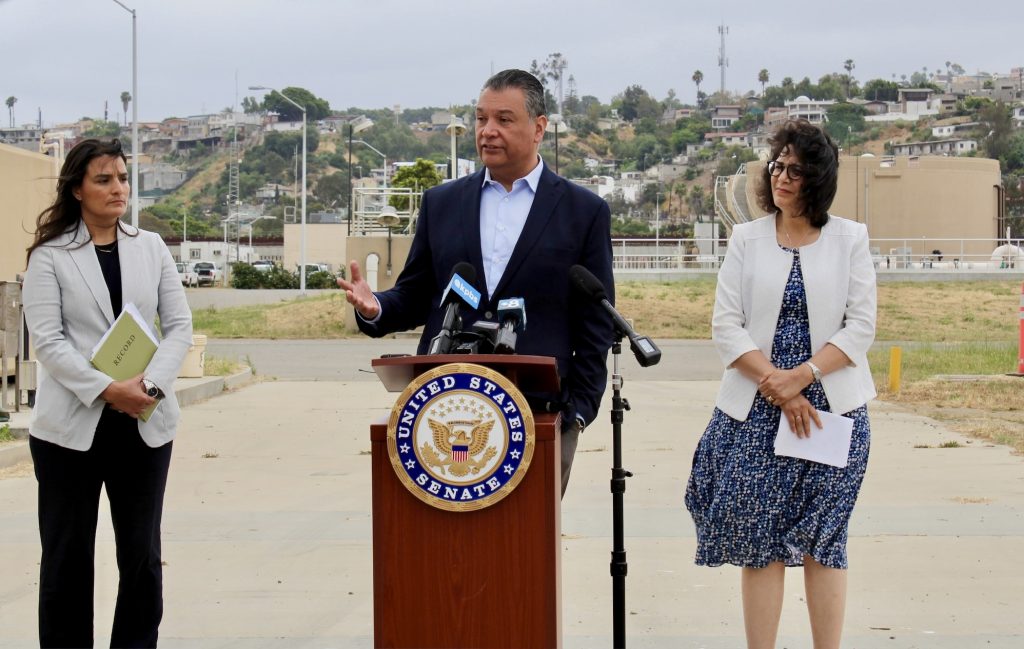June 9, 2023 — In a determined effort to spotlight federal responses to water pollution in the U.S.-Mexico border area, U.S. Senator Alex Padilla (D-Calif.) made a visit on Monday to the U.S. International Boundary and Water Commission (IBWC) Wastewater Treatment Plant, situated near the border in San Diego. There, he announced that $300 million has been budgeted to stem the flow of raw sewage from Mexico into California
made a visit on Monday to the U.S. International Boundary and Water Commission (IBWC) Wastewater Treatment Plant, situated near the border in San Diego. There, he announced that $300 million has been budgeted to stem the flow of raw sewage from Mexico into California . The money is part of the U.S.-Mexico-Canada trade agreement, which set aside money to clean up the environment along the southern border.
. The money is part of the U.S.-Mexico-Canada trade agreement, which set aside money to clean up the environment along the southern border.
During heavy storms or when facilities in Tijuana break down, millions of gallons of raw sewage flow downhill into the U.S. side of the border in the Tijuana River Valley and out to sea, contaminating miles of Southern California beaches. According to Muckrock News , “The Imperial Beach and Coronado areas of California have been deeply impacted by the Tijuana sewage crisis, leading to hundreds of days of beach closures and thousands of people sickened by sewage and toxic waste that has poured from the Tijuana River into the Pacific Ocean.”
, “The Imperial Beach and Coronado areas of California have been deeply impacted by the Tijuana sewage crisis, leading to hundreds of days of beach closures and thousands of people sickened by sewage and toxic waste that has poured from the Tijuana River into the Pacific Ocean.”
During his visit, Senator Padilla was briefed by representatives from the U.S. Environmental Protection Agency (EPA) and IBWC about their current projects aimed at reducing pollution in the region.
Raw Sewage Crisis Prompts Protests.
The Coronado Eagle & Journal  reports that Coronado residents protested the situation last weekend, writing:
reports that Coronado residents protested the situation last weekend, writing:
Almost a hundred Coronado residents turned out Saturday morning for a protest and press conference concerning the Coronado beach closures and raw sewage pollution from across the border closing beaches – perhaps for extended months or even years – from Imperial Beach to Coronado’s dog beach. Twelve miles of coastline are closed due to raw sewage spills. According to Romina Scheiss, San Diego County’s Supervising Environmental Health Quality Specialist “Yes, the numbers are high. This is due to the Tijuana River flowing and the south swell pushing the contaminated waters north.”
The Coronado Cays and Silver Strand State beach have been closed due to sewage since February of this year. Imperial Beach has been closed since December of 2022, and Coronado’s main beaches since May 5th. No official will commit that the problem can be alleviated this summer or even for the four years required to reconstruct the wastewater facilities at the US side of the border and in Mexico. Residents are upset, as summer brings south swells all summer long.
Concerns Over Tijuana River Border Wall Project.
Additionally, the Senator engaged with various stakeholders, discussing potential environmental and flooding impacts that the proposed Tijuana River border wall project might cause in the region. Following the briefing, Senator Padilla took part in a media availability.
Confronting Environmental Threats.
“For far too long, toxic waste and raw sewage have flowed across the border into Southern California, introducing health hazards and environmental threats into our own backyards,” said Senator Padilla . “This contamination keeps polluting Southern California’s air and water, stripping communities of outdoor recreational opportunities and economic prospects. It’s crucial we expand upon the federal investments made last year to implement a comprehensive, long-term solution to improve sewage treatment in both San Diego County and Tijuana.”
. “This contamination keeps polluting Southern California’s air and water, stripping communities of outdoor recreational opportunities and economic prospects. It’s crucial we expand upon the federal investments made last year to implement a comprehensive, long-term solution to improve sewage treatment in both San Diego County and Tijuana.”
Praise for Padilla’s Advocacy.
In reaction to Senator Padilla’s visit and commitment, Dr. Maria-Elena Giner, P.E., Commissioner, IBWC, United States Section, expressed gratitude, saying, “We are grateful for the Senator’s attention to this plant and for his support on improving sanitation efforts along the U.S.-Mexico border. We look forward to continuing our collaboration on obtaining the necessary funding to reduce the transboundary flows for the benefit of the beaches and surrounding communities.”
Calling for Collaboration.
EPA Pacific Southwest Regional Administrator Martha Guzman highlighted the need for ongoing cooperation at all levels of government. “Border communities share one watershed, and the solutions to reducing pollution in our shared environment require collaboration,” Guzman noted.
Securing Crucial Funding for Water Infrastructure.
Senator Padilla has proven instrumental in obtaining vital funding for this environmental mission. He managed to secure language in the FY 2023 appropriations package to remove bureaucratic hurdles and allow the EPA to allocate $300 million previously secured in the U.S.-Mexico-Canada Agreement to the IBWC for water infrastructure projects.
This funding is critical for reducing transboundary water pollution in the San Diego/Tijuana region. Furthermore, Padilla worked to secure an additional $3.45 million for the Smuggler’s Gulch Dredging Project in San Diego County, aiming to clean up trash and sediment from Smuggler’s Gulch channel and safeguard downstream properties, habitats, communities, and the health of the environment in the Tijuana River Watershed and adjacent coastal waters.
Image:
Padilla visits Tijuana River Valley, urges action to address water pollution in the area, via Sen. Padilla press release .
.


Leave a Reply